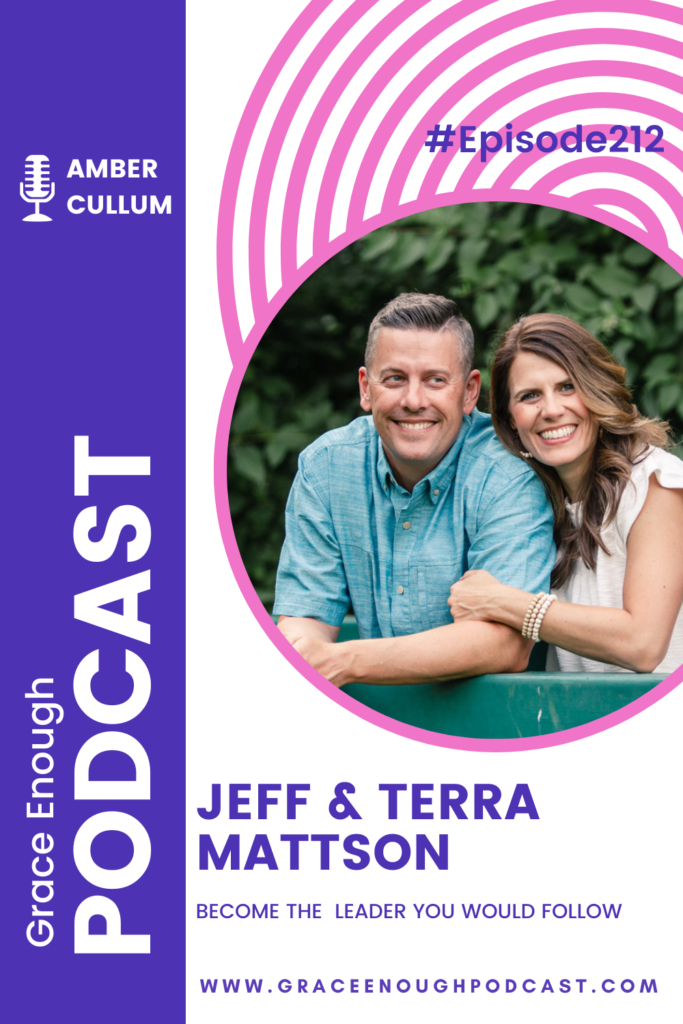
Jeff Mattson (MA ORGL) and Terra Mattson (MA LPC, LMFT) are the husband and wife team who founded Living Wholehearted and Courageous Girls.
Living Wholehearted is a professional counseling and organizational leadership development firm outside Portland, Oregon, and Courageous Girls is a global movement and curriculum helping moms walk with their daughters at every stage of their growing years.
Terra is an Executive Coach, Licensed Marriage and Family Therapist, Licensed Professional Counselor, speaker, and author of Courageous: Being Daughters Rooted in Grace (David C. Cook, 2020).
Jeff is a former pastor, executive coach, organizational development consultant, and speaker.
Together they co-authored Shrinking the Integrity Gap: Between What Leaders Preach and Live (David C. Cook, 2020).
They are the co-hosts of the Living Wholehearted Podcast and Dear Mattsons parenting advice series, and Terra is the creator of the Helping Moms Raise Confident Daughters Courses at cpguides.org.
So you never miss a new episode.
Jeff & Terra Mattson join Amber to discuss their book, Shrinking the Integrity Gap between What Leaders Preach and Live. They dive into how unresolved trauma impacts a leader, the gap between our values and habits, and some healthy tips for shrinking the gap.
Terra: “By the grace of God, Jeff and I started really young working on…our baggage. As Jeff says. ‘We wanted to get our baggage down to carry on size,’ so we didn’t carry it into the legacy of our leadership and our children.”
Terra: “Leaders end up getting thrown into leadership without the ability, or the time, or the wisdom to work through the pain of their past, and to grow that inner character before the pressures of leadership take its toll.”
Jeff: “The whole point… [of going] back to do that hard work to get your baggage down to carry on size…is so you can be more available to actually help meet the needs of others without needing to use them to get your needs met in an unhealthy way.”
Jeff: “We have a high view of Scripture, I believe in the power of the Word of God…but it needs to be properly applied.”
Terra: “We need experiential examples of Christ. And that’s often what’s missing. When we put a Scripture in front of people and when we say just memorize this…actually, that’s only one part….If I say, ‘I love you,’ and then I don’t look you in the eye all day long,…the impact of ‘I Love You’ doesn’t change the brain in the same way.”
Terra: “I think God is the best trauma therapist out there. Because when I watch how he works in our lives, he’s slow….Trauma therapy is I’m going to go a slow, we’re going to take our time, and we’re going to grieve, and we’re going to move through….There is a process and a pace we have to go for the brain to catch up, for the body to catch up to where the mind and the spirit want to go. And that’s really discipleship at its best.”
Terra: “[Trauma] comes in lots of forms. Trauma affects the body and then we start to feel it over the years in the way that we respond to our current present environment. And the difference between someone who has what’s called Post Traumatic Stress Disorder, and someone who doesn’t, is the way they were comforted after the trauma.”
Jeff: “The gap is the distance between the values that we would espouse about ourselves, and the values we live in practice.”
Terra: “We’re trying to help grow the body of Christ in wisdom and discernment about what is toxic and what is just humanity. There’s a very clear difference in what the Scriptures say what is wicked versus what is foolish.“
Terra: “We talk about this in the book of the cost of confession, and that there’s a difference between a Saul heart and a David heart….They’re both anointed, they both are gifted, and they both have a call, but when Saul is facing his consequences, he manages it. He does a confession to manage the cost. David confesses and it was no management. He says, I’ll receive whatever comes. And the David heart is the one after God’s heart. “
Terra: “If you quickly dismiss hard, that’s actually a big sign that you have trauma.”
Jeff: “When we understand that He is the source of our healing and He uses people that He made to help us heal. We’re hurt in relationships, and we heal in relationships, as Terra likes to say.”
Terra: “But the grace is…we have a second chance, we have opportunities for restoration and redemption, a David heart versus a Saul heart. It’s not about perfection. It’s about honesty. It’s not about doing it all on your own. It’s about doing it before God and others. That’s the shift that brings a sense of ah, I can mess up, but I can also make it right.”
Jeff: “We need to get over the idea that asking for help, or getting help for anything is a sign of weakness. It actually is a sign of maturity, it’s a sign of strength, it’s a sign of wisdom. And God is with us in that. He’s leading us to discover these things.”



Don’t worry, your information will not be shared, nor will I spam you 🙂
© Grace Enough Podcast2024